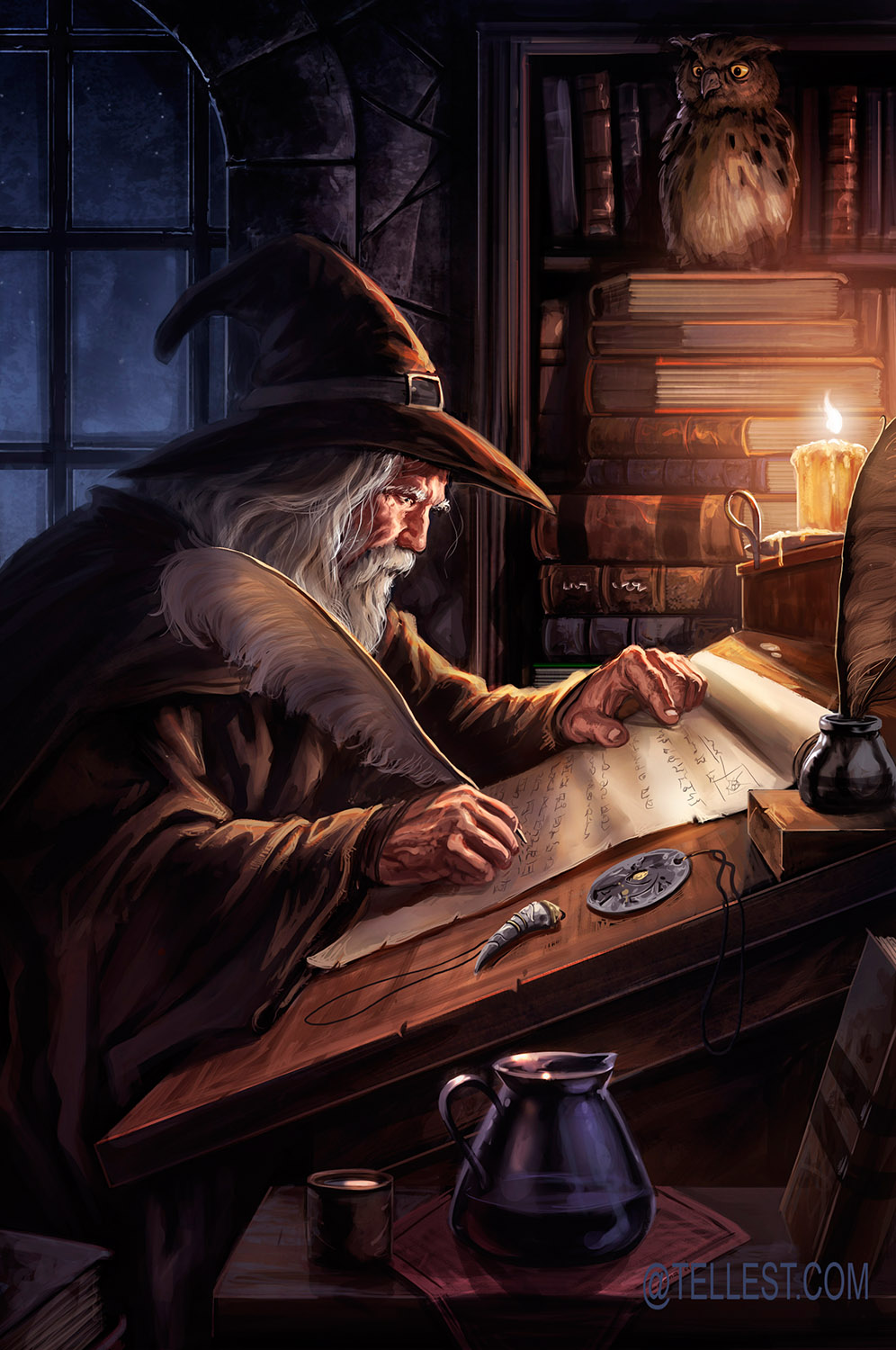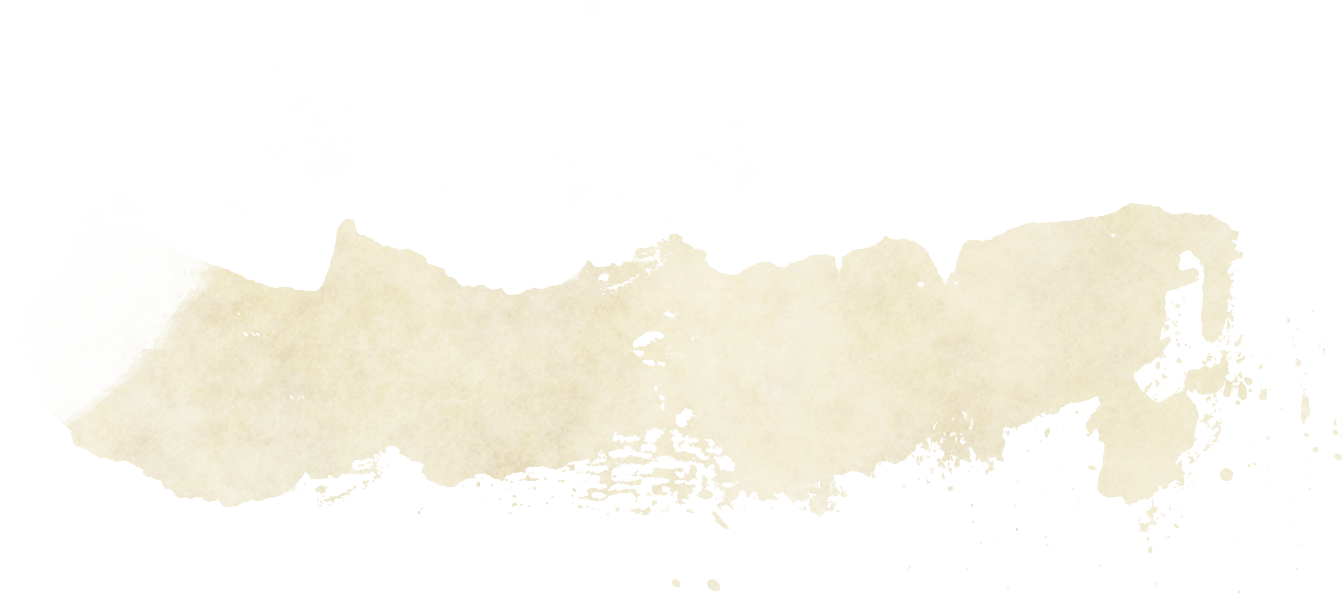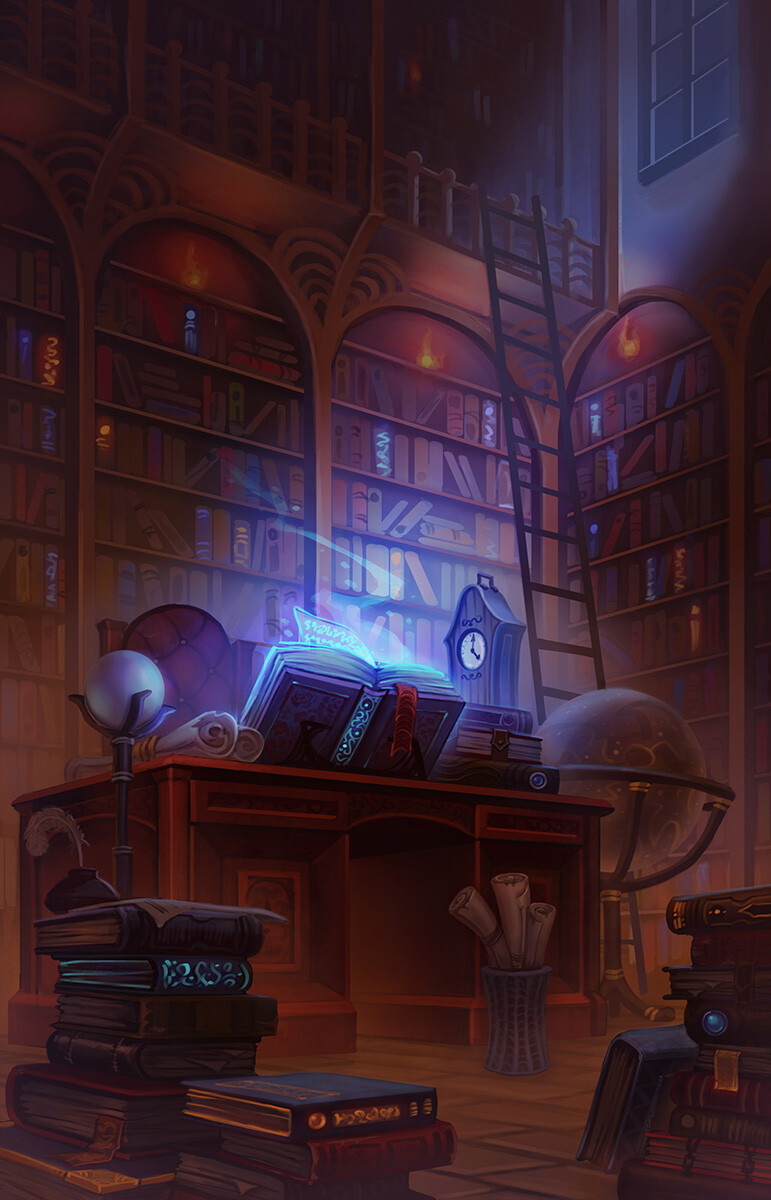Revised Wizard
An elf with large awe-filled eyes walks through the halls of a grand public library, her fingers lightly brushing the spines of the books on the restricted shelves. Each one, she knew, was filled with spells. She picks one entitled Perceptions and Illu-sions and begins to read.
A wizened human sits alone in his tower, turning the pages to a section of his coffee-stained spellbook. These words he's seen a thousand times, and this time as always, the letters burn urgently, frantic to leave the heavy confines of the tome. He coaxes the spell off the pages into a compartment in his mind, sequestered safely in a spell slot. The spell stretches, as though waking from slumber. This sensation, to the human, was no less familiar. He turns the page.
A gnome stops atop a hill overlooking their burning village. Panicked, through tears and gritted teeth, they turn the pages of their spellbook and read aloud. The ink glows as the spell completes, and the words fade from the vellum permanently. Above, dark clouds form as a storm of sleet falls in the middle of a cloudless day.
Wizards are seekers of lore, their knowledge empirical, ar-bitrary. They toil in search of the codes, dials, and knobs that twist the Weave just so, in hopes of glimpsing the pattern un-derlying the mosaic of magic. Their spellbook is a symbol of their achievements, and they read it several times a day.
Scholars of the Arcane
Intelligent, calculating, and methodical, wizards live and die by their ability to foresee every eventuality of every scenario they may or may not encounter that day. They are known as magical swiss army knives who always have the right spells.
A wizard generally finds satisfaction in several things: fin-ding a new spell scroll, being gifted a new spellbook, and the vindication of preparing the correct spell to solve an obscure situation they've found themselves in.










–Spell Slots per Spell Level–
The Revised Wizard
| Class Level |
Proficiency Bonus |
Class Features |
0th | 1st | 2nd | 3rd | 4th | 5th | 6th | 7th | 8th | 9th |
|---|---|---|---|---|---|---|---|---|---|---|---|---|
| 1st | +2 | Vancian Spellcasting, Spellbook | 5 | 2 | — | — | — | — | — | — | — | — |
| 2nd | +2 | Arcane Tradition | 5 | 3 | — | — | — | — | — | — | — | — |
| 3rd | +2 | ─ | 5 | 4 | 2 | — | — | — | — | — | — | — |
| 4th | +2 | Ability Score Improvement | 5 | 4 | 3 | — | — | — | — | — | — | — |
| 5th | +3 | ─ | 5 | 4 | 3 | 2 | — | — | — | — | — | — |
| 6th | +3 | Arcane Tradition feature | 5 | 4 | 3 | 3 | — | — | — | — | — | — |
| 7th | +3 | ─ | 5 | 4 | 3 | 3 | 1 | — | — | — | — | — |
| 8th | +3 | Ability Score Improvement | 5 | 4 | 3 | 3 | 2 | — | — | — | — | — |
| 9th | +4 | ─ | 5 | 4 | 3 | 3 | 3 | 1 | — | — | — | — |
| 10th | +4 | Arcane Tradition feature | 5 | 4 | 3 | 3 | 3 | 2 | — | — | — | — |
| 11th | +4 | ─ | 5 | 4 | 3 | 3 | 3 | 2 | 1 | — | — | — |
| 12th | +4 | Ability Score Improvement | 5 | 4 | 3 | 3 | 3 | 2 | 1 | — | — | — |
| 13th | +5 | ─ | 5 | 4 | 3 | 3 | 3 | 2 | 1 | 1 | — | — |
| 14th | +5 | Arcane Tradition feature | 5 | 4 | 3 | 3 | 3 | 2 | 1 | 1 | — | — |
| 15th | +5 | ─ | 5 | 4 | 3 | 3 | 3 | 2 | 1 | 1 | 1 | — |
| 16th | +5 | Ability Score Improvement | 5 | 4 | 3 | 3 | 3 | 2 | 1 | 1 | 1 | — |
| 17th | +6 | ─ | 5 | 4 | 3 | 3 | 3 | 2 | 1 | 1 | 1 | 1 |
| 18th | +6 | Spell Mastery | 5 | 4 | 3 | 3 | 3 | 3 | 1 | 1 | 1 | 1 |
| 19th | +6 | Ability Score Improvement | 5 | 4 | 3 | 3 | 3 | 3 | 2 | 1 | 1 | 1 |
| 20th | +6 | Signature Spells | 5 | 4 | 3 | 3 | 3 | 3 | 2 | 2 | 1 | 1 |
Class Features
As a wizard, you gain the following features.
Hit Points
- Hit Dice: 1d6 per barbarian level
- Hit Points at 1st Level: 6 + your Constitution modifier
- Hit Points at Higher Levels: 1d6 (or 4) + your Constitution modifier per wizard level after 1st
Proficiencies
- Armor: None
- Weapons: Dagger, dart, sling, quarterstaff, light crossbow
- Tools: None
- Saving Throws: Intelligence, Wisdom
- Skills: Choose 2 from Arcana, History, Insight, Investigation, Medicine, and Religion
Equipment
You start with the following equipment:
- (a) a greataxe or (b) any martial weapon
- (a) two handaxes or (b) any simple weapon
- An explorer's pack and four javelins








Back to Vancian
This change aligns the themes of the wizard—an intelligent person who plans for every eventuality—with its mechanics. This complexity renders the wizard harder to play by design.
These rules model spells differently: as entities trapped in spellbooks, absorbed into the wizard's mind during preparation and released during cas-ting. It's closer to, but not exactly the same as, Jack Vance's magic than 5e.
This change introduces a few benefits:
- You can change your cantrips on the fly
- You can prepare your spells at any time
- You can prepare spells from any spellbook
- Your dependence on long rests is removed
- Spell slots make sense again
This wizard's limiter is preparation time, which isn't light activity. Also, this wizard cannot have a means of expending or regaining spell slots. Only a multiclassed wizard gains this ability.
In multiclassing, the general rule still applies. You determine the wizard spells you can prepare based on your wizard level, not your total level.
Vancian Spellcasting
As a student of arcana, you've learned how to trap spells—pseudo-living entities capable of producing discrete magical effects—in a special book of spells.
Spell Slots
To wizards, spell slots are mental partitions that can hold the power of a spell. Powerful wizards have many such compart-ments in their mind, having the will to hold multiple spells at a time without going mad.
The Revised Wizard table shows how many spell slots you have to cast your spells. A spell slot is closed if it already holds one spell, or if it is expended.
Preparing and Casting Spells
You prepare wizard spells by reading a spellbook, creating a copy of a spell from a spellbook and forcing it to an open spell slot in your mind, granted that the spell's level is no greater than the level of the spell slot that will hold it. This process requires great effort to perform: 1 hour for each level of the spell. You can prepare a cantrip at any time (no action required) granted that you can read the page it's written on from an open spellbook and you have an open spell slot.
An example: a 3rd level wizard has three 0th-level, four 1st-level, and two 2nd-level spell slots. If their spellbook has light, jump, shield, grease, and sleep, they can prepare these spells: at 2nd-level, one grease and one sleep; at 1st-level, one jump, one grease, and two shields; at 0th-level, three lights.
To cast a prepared spell, you must release it from its spell slot, with the needed time and components of the spell you cast serving as the trigger. The cast spell's level is the level of the spell slot that contained it (except cantrips, which are al-ways cast at 0th-level). This mode of casting does not expend the spell slot. If a spell slot that holds a prepared spell is ex-pended before the spell is cast, the prepared spell is lost.
Expediting Spell Preparations
You can prepare spells faster at risk to you through a more complex process. Before preparing a spell, you can set a pace between 1 and 100. Your preparation time is divided by your pace. At the end of this time, roll a d100. If the roll is lesser than 100⁄your pace, you prepare the spell. Else, you take psychic damage equal to 2 × the spell's level × your pace that can't be reduced and ignores resistance and immunity.
If this damage brings your hitpoints to 0, the DM may opt to petrify you, grant you madness, place you under the effects of feeblemind, kill you outright, and so on.
In the absence of a spellbook, you can also prepare wizard spells from spell scrolls. There's a 33% chance that the spell scroll is consumed each time it's used this way.
Spellcasting Focus
You can use an arcane focus as a spellcasting focus for your wizard spells.
Spellcasting Ability
Intelligence is your spellcasting ability for your wizard spells.
Spell Save DC
Spell attack modifier
Spellbook
At 1st level, you have a spellbook that contains six 1st-level wizard spells and two 0th-level spells of your choice. Your spellbook has 100 vellum pages. A spell occupies a number of pages equal to ten times its level in your spellbook. A cantrip—a 0th level spell—takes up five pages.
Casting from the Spellbook
You can cast a spell directly from your spellbook even if you haven't prepared it. To do so, you must read the page it's writ-ten on from your open spellbook, requiring its normal casting time but ignoring its material components. The spell is cast at its lowest level. Afterwards, the words on the pages fade as all traces of the spell are erased from your spellbook.
If the spell is of a higher level than you can normally cast, you must make an Intelligence check (DC = 10 + the spell's level) to cast it. On a failed check, the spell is erased from your spellbook with no other effect.
If the spell has the ritual tag and is of a level that you can normally cast, you can cast it as a ritual. This prevents it from being erased from your spellbook after the casting ends.
Copying a Spell from a Spellbook
You can transfer spells between spellbooks, provided you can spare the time to do so.
For each level of the spell, the process takes 2 hours and costs 50 gp (cantrips count as 1st-level for this purpose). The cost represents material components you expend as you experiment with the spell to master it, as well as the fine inks you need to record it.
Once you have spent this time and money, the spell is dele-ted from the original spellbook as the spell, the trapped entity, is wholly transferred into the second one.
Copying a Spell from a Spell Scroll
A wizard spell on a spell scroll can be copied just as spells in spellbooks can be copied. When a spell is copied from a spell scroll, the copier must succeed on an Intelligence (Arcana) check (DC = 10 + the spell's level). If the check succeeds, the spell is successfully copied. Whether the check succeeds or fails, the spell scroll is destroyed.
Replacing the Book
Making a backup spellbook is arduous as doing so erases the spell from its source, whether spellbook or spell scroll.
To make a backup, you must acquire spell scrolls and copy them to a new blank spellbook normally. You must repeat this process for each of your backup spellbooks.
A prepared spell contained in a spell slot in your mind is only a shallow copy and does not have enough substance to be inscribed as a spell back into a spellbook.
Scribing a Spell Scroll
You may create a scroll of a spell that is in your spellbook according to the Scribing a Spell Scroll rules in page 133 of Xanathar's Guide to Everything. This process creates a true duplicate spell and doesn't erase the original spell from your spellbook.
Open Source Magic
The spellbook is the core of this wizard. The flexi-bility taken by Vancian spellcasting is offset by the ability to cast spells directly from the spellbook.
Usually, casting from the book means you lose the spell. This incites wizards to acquire scrolls to prevent this, and if most wizards have a stock of scrolls, this implies a spell scroll economy. If spells are openly traded, then ideas are too, culminating in a cornerstone of worldbuilding and the reason why this wizard exists at all: to dawn a magical renaissance, an age of open source magic. The logical end of this constraint is the establishment of spellbook libraries and spell scroll archives.
There's a catch: if information is so free, then wi-zards should have all known spells in their books. Regulating this can be a problem. This is where re-source constraints can help: there are 30 wizard cantrips. A complete set of scrolls costs 3000 gp, and it takes 60 hours, 1500 gp, and 2 spellbooks to scribe them all. The restrictive nature of copying means even if you loan such a spellbook, you can't make a copy without destroying the original. A true duplicate spellbook takes 30 days and 450 gp to craft the spell scrolls, and the cost in time and gold for scribing needs to be paid again. Despite their abundance, spells are still expensive to collect.
Limited resources will prevent a 1st level wizard from having a tome of all spells, but they can use their library card to access and prepare any spell available at the public library.





Arcane Tradition
When you reach 2nd level, you choose an arcane tradition, shaping your practice of magic through one of the following schools.
| Arcane Tradition |
|---|
| Abjuration |
| Chronurgy |
| Conjuration |
| Enchantment |
| Arcane Tradition |
|---|
| Evocation |
| Illusion |
| Necromancy |
| War Magic |
Excluded Arcane Traditions
Some arcane traditions aren't listed here: the ones that mention expending or regaining spell slots, which is incompatible with this design. The Order of Scribes is excluded for its incompatibility with this wizard's spellbook feature.
Ability Score Improvement
When you reach 4th, 8th, 12th, 16th, and 19th level, you can increase one ability score of your choice by 2, or two ability scores of your choice by 1, to a maximum of 20.
Spell Mastery
At 18th level, you have achieved mastery over certain spells. Choose a 1st-level and 2nd-level wizard spell from your spell-book. You can cast these spells directly from your spellbook without causing them to be erased. You still must prepare them at a higher level to cast them at a higher level. By spen-ding 8 hours in study, you can exchange one or both of these spells for different ones of the same levels.
Signature Spells
When you reach 20th level, you gain mastery over two spells. Choose two 3rd-level wizard spells in your spellbook. You can cast each of them once directly from your spellbook without causing them to be erased. You must finish a short or long rest before you can do so again. You still must prepare them at a higher level to cast them at a higher level.










